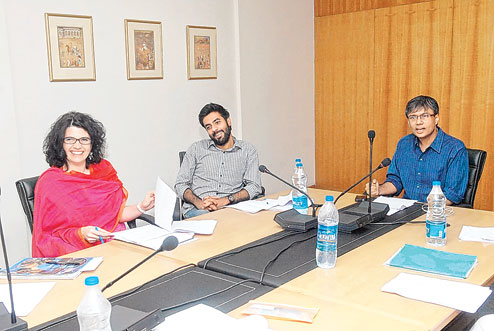 |
| Author Amit Chaudhuri at the creative writing workshop. Picture by Sanjoy Chattopadhyaya |
Writing is an odd thing, said Romesh Gunesekera. People think you are on your way to the asylum. “Maybe you are,” he added encouragingly.
But at some point it has to become real. “Real choices have to be made,” he said on a more serious note. First, you have to find time, he said, pronouncing the word almost in capital letters. Money, which is fundamental; you have to sort it out. You need support, at least one fan, whom you could be married to. Talent, you have to have it, but you don’t know till you know. Luck, of course, but there’s not much you can do about it either.
If you have successfully negotiated with these five elements of fate and circumstance, at the end of the perilous journey, you could be rewarded with a published book, he warned. But the 11 persons in the room that the charming UK-based Sri Lankan origin novelist was speaking to looked undaunted and sprang to get his autograph.
Gunesekera had finished conducting, with city-based writer Amit Chaudhuri, the University of East Anglia creative writing workshop that was held in the city for the first time, from March 25 to April 1, at ICCR. Twenty-two persons, including four from abroad, had attended the workshop intended not for ingenues but for “emerging writers of talent”, said Chaudhuri. There were quite a few of them, Chaudhuri assured.
In the eight days the two novelists conducted the classes in two groups with 11 persons in each. One tutor met one group for four days and the following four days the group met the other tutor.
Some of the participants wrote strikingly. Radhika Oberoi wrote about a young woman who leaves her husband’s home after he throws at her her inept chicken curry that has more curry than chicken. The spicy droplets land on her forgotten copy of Lolita instead. When she leaves, she takes her other books too. The story — beginning of a novel? — augurs the travel of Lolita, Such a Long Journey and Dracula. Radhika Iyenger writes with sharp, brittle images about a 27-year-old man turning away from life. Vineet Gill writes about a stalker who lives in his prey’s mind.
No, they didn’t feel vulnerable opening up stuff they were writing to others. Initially a little inhibited perhaps, but then they felt that they were among sympathisers. For Jocelyn Watson, a London resident born of Indian and British parents, the workshop was exhilarating.
Which leads to the Scylla and Charibdes of creative writing courses. Two questions: Can writing be taught? And doesn’t writing that comes out of these courses look identically well, like gym-toned bodies?
“I am partly sceptical about the uses of creative writing courses,” says Chaudhuri. He did not come out of any, he points out. “But having said that, one can use it in one’s own way,” he says. A lot depends on what the tutors bring to the course.
“Romesh provided precise guidance on using words and editing skills and detachment from one’s own writing. I tried to talk about their work in the larger context of literature. In order to write, one should be able to read one’s own work in the light of the work of others,” says Chaudhuri.
As for the “homogeneous” writing that comes out of classes, Chaudhuri says it’s more the product of American writing courses yet to get over Hemingway and Raymond Carver. Writing is pared down, but often it’s just a “gesture”, says Chaudhuri, for the effect is sentimental. “Everybody sounds skilled and competent but also homogenised,” he adds. Lean, mean and assembly line.
“But a florid piece can work if it is precise where it matters,” says Chaudhuri. At the University of East Anglia, which is well-known for its creative writing courses and where Chaudhuri teaches contemporary literature, “there is more space for wayward thinking”.
But writing also demands control over chaos. Perhaps the workshop will help a bit with both.










